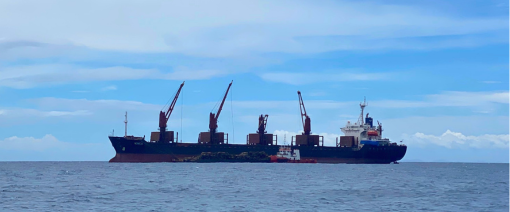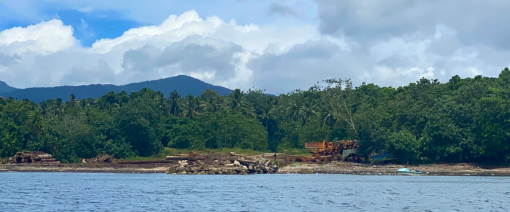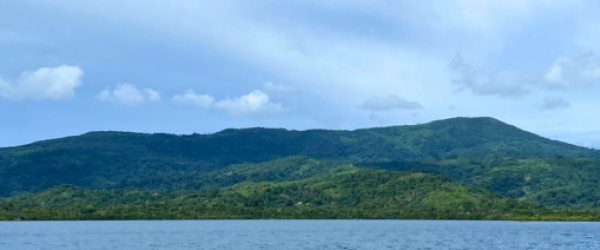Tommy Esau, Pacific Outreach Specialist at Jubilee Australia, travelled to Solomon Islands in October 2023 for discussions and a workshop with members of Mai-Maasina Green Belt, an organisation that advocates for intact forest management, wildlife protection, and cultural preservation in the Southern region of Malaita Province. The workshop was the start of a new partnership which hopes to share knowledge with communities in Malaita on building sustainable livelihoods without logging.
As we enjoyed the boat ride in the spectacular Langalanga Lagoon from Auki to Wai-Hau in West Are`are, in Malaita, I was mesmerised by the beauty of the artificial islands that the local people have built lived and survived on for many years. As we left the lagoon and headed to the west side of the island, my eyes caught a barge logging ship anchored outside of Maoa community, one of the log points in Malaita, loading round logs and shipping them mainly to China. It is sad to see our vital resources exploited. The people here depend on the land and sea for their culture, livelihoods and well-being. That is the struggle our local people face.

Even though logging has brought some benefits, such as money and short-term employment, to the country and local economies, many people are beginning to speak out about the negative implications of these destructive logging projects. Local people who have allowed their land to be logged are experiencing long-term negative impacts on their land and water and face tragic social issues like conflicts between tribes and alcohol abuse. Unequal sharing of benefits has bred disharmony between nature, tribes and families. Promises that development would follow the logging projects, such as infrastructure, clinics, schools, and sanitation, were broken.
Wado ngai na momori lameeru no`o.Lauta ngaia `e nana`I fofo`afu na ngaia `e le`a. Ma lauta nga `ola mala nga logging ngaia `e ngadaa no`o, mai ngaia sia le`a la`u. Tofuna ngaia te`e ngadaa no`o nga osolaa ameeru, ma tafa`I ameeru, ma afiafirina species ngaia gila nana`I fofona wado.Lauta guru aga `afui le`a na wado mai ngaia te`e langoni`a dauru maa te`e aga le`a la`a mola suri`adaru ma fana na`o dauru.
“Land (wado) is our life. Land is better when it is in its original state. But if it is destroyed from its original state, then it is no longer valuable. If things like logging come and destroy our land, they will destroy our food, our water and every species that lives there. When we take good care of land then it will look after us, our children and the future generations." – Man from Kafurum, Kwaio, Malaita, one of the research participants.

I’m on my way to Wai-Hau for a two-day workshop to plan a collaborative research project between Mai-Maasina Green Belt (MMGB) and Jubilee Research Centre looking at how communities in Malaita are using their land for livelihoods. MMGB is an indigenous founded and local organisation in Solomon Islands, which began in 2017. It now works with 28 communities in Malaita to stand together to protect their land, cultural heritage and promote sustainable uses of resources and development.
While cruising along the reef and looking across to the mountains I can see logging roads and log points. At the same time, I am reflecting on our main research question: can Malaita communities build sustainable livelihoods without logging? This is not a simple question, but a question that our people, leaders, government, and partners need to consider urgently as the Solomon Islands logging industry has been operating since the 1920s, and the country still relies heavily on extractive industries for revenue.
One thing I have been reflecting on since the workshop was the session on “free, prior and informed consent” (FPIC). Participants have revealed that this is the process that most logging companies failed to do properly. There is no free, prior and informed consent from all clans and tribes connected to the land. Also, most discussions and agreements are conducted by men and women are usually excluded from those processes. In many cases, consultation processes are poor. People and companies focus on money and benefits but fail to assess and address negative impacts and the long-term consequences they might impose on the local people and on their land and their lives. Usually, the information provided by the logging company is unclear and is not accessible or understandable by local communities.
This collaborative research project that MMGB and Jubilee Australia are conducting will provide information and stories from communities regarding logging practices on the ground and raise awareness and knowledge of local communities on sustainable land and forest management and implementation for livelihood improvements.
Prior research evidence has shown that logging is not a form of sustainable development for our communities in Malaita; we need a different model. Our land is our mother. The value of money one gets cannot be measured by the plot of land a tribe or family has. Logging destroys not only our land but its natural state and all life that depends on it. Nature, however, guides us on how to live harmoniously. We are interdependent on the natural world. Once we look after it, it will also look after us.
Written by Tommy Esau, Pacific Outreach Specialist at Jubilee Australia
Would like to support more projects like this?
